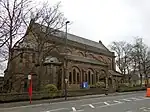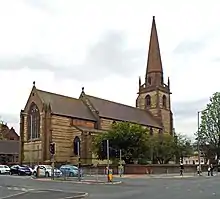The English Missal (sometimes referred to as the Knott Missal) is a translation of the Roman Missal used by some Anglo-Catholic parish churches. After its publication by W. Knott & Son Limited in 1912, The English Missal was rapidly endorsed by the growing Ritualist movement of Anglo-Catholic clergy, who viewed the liturgies of the Book of Common Prayer as insufficient expressions of fully Catholic worship. The translation of the Roman Missal from Latin into the stylized Elizabethan Early Modern English of the Book of Common Prayer allowed clergy to preserve the use of the vernacular language while adopting the Roman Catholic texts and liturgical rubrics.
The only difference in content from the Roman Missal of the time is The English Missal's inclusion of certain texts from the Book of Common Prayer, including optional prayers from the ordinary of the Prayer Book's Communion Service and the lessons for Sundays and major feast days from the Prayer Book's lectionary, which was itself taken from the earlier Sarum Use Mass of pre-Reformation England.
After the Public Worship Regulation Act 1874 threatened imprisonment for priests using ritualist liturgical practices, a custom arose of the celebrant saying the Roman Canon in Latin to himself silently (i.e., sotto voce, in a soft voice) in addition to saying the official texts of the Book of Common Prayer aloud. While enforcement of the Public Worship Regulation Act ended in 1906, the custom persisted, due in part to the fact that in the pre-Vatican II Roman Rite the Canon of the Mass was always said likewise quietly. For this reason, the Latin text of the Canon of the Mass was included in The English Missal in addition to the English translation.
The English Missal went through five editions. The first four were based on the Roman Missal of Pius V as revised until the time of Pope Pius X. The last edition includes the revised Roman Catholic Holy Week of 1958. One American edition includes material that conforms to the American 1928 Book of Common Prayer.
Influence and legacy
The Swahili liturgy approved for use in the Anglican Diocese of Zanzibar permitted the usage of the English Missal's prefaces, these being taken from the 1662 prayer book and the Roman Missal.[1]
In the aftermath of the Second Vatican Council and the subsequent authorization of new typical editions of the Roman Missal with official translations in English, the use of The English Missal has greatly declined. Especially in England, the English version of the Roman Missal is widely used in Anglo-Catholic parishes. However, the use of The English Missal continues in a small number of liturgically traditional Anglican parish churches in England and the United States. In 2021, The English Missal was adopted by the Oxford English Missal Society, which has since organized Masses according to the missal at Pusey House and elsewhere in the Oxford area.[2]
Current use
Church of England
| Parish | Image | Location | Notes | Refs |
|---|---|---|---|---|
| All Saints, North Street |  |
York | [3] | |
| St Chad, Toller Lane |  |
Bradford | [4] | |
| St John the Baptist, Tuebrook |  |
Liverpool | The English Missal is used for 11 a.m. High Mass on Sundays and all weekday Masses. | |
| St Luke, Southport | _(September_2021)_(2).JPG.webp) |
Southport | The English Missal is used for Low Mass on Fridays. | [5] |
| St Magnus the Martyr, London Bridge |  |
London | The English Missal is used for 11 a.m. High Mass on Sundays. | [6] |
Episcopal Church (United States)
| Parish | Image | Location | Notes | Refs |
|---|---|---|---|---|
| St Clement, Philadelphia |  |
Philadelphia | [7] | |
Anglican Church of Australia
| Parish | Image | Location | Notes | Refs |
|---|---|---|---|---|
| All Saints Anglican Church, Brisbane |  |
Brisbane | The English Missal is used for 9:30 a.m. Solemn High Mass on Sundays. | |
See also
References
- ↑ Wigan, Bernard, ed. (1964). "Appendix A: Proper Prefaces". The Liturgy in English (2nd ed.). London: Oxford University Press.
- ↑ "Oxford English Missal Society". Retrieved 17 June 2021 – via Facebook.
- ↑ "Home". All Saints Church – North Street, York. Retrieved 11 November 2022.
- ↑ "About Us". S. Chad’s Toller Lane. 3 August 2022. Retrieved 11 November 2022.
- ↑ "The English Missal - S. Luke's Church, Southport". sluke.co.uk. Retrieved 11 November 2022.
- ↑ "Public Worship & Private Prayer". St. Magnus The Martyr, London Bridge. Retrieved 11 November 2022.
- ↑ "F.A.Q". S. Clement's Church, Philadelphia. Retrieved 11 November 2022.
External links
- Bibliography of The English Missal, Compiled by Paul Goings, Richard J. Mammana, and W. Steven Woodward
- Order of Mass in the English Missal (English and Latin)
- Propers of the English Missal